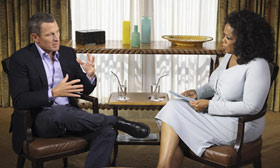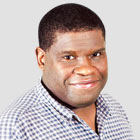Everything in France points to the Americanisation of French politics; from televised debates between aspiring candidates in the run-up to the presidential elections, to the evolution of the primary election system within the French socialist party, and the staging of candidates' private lives on the front page of celebrity magazines, which didn't even exist a year ago.
One could argue that the phenomenon is not new but represents the latest stage of a long process, which began almost 200 years ago.
It all started with Alexis de Tocqueville, the French liberal aristocrat who, in 1830, travelled throughout the US to observe and dissect the young democracy. What he saw there simply fascinated him. The book he went on to write, Democracy in America, remains to this day one of the biggest best-sellers in French literature. The French fascination for the American political model began with Tocqueville and continues today, for instance with philosopher Bernard Henry Levy, who, for his latest book American vertigo, endeavoured to retrace Tocqueville's steps in America.
Over the years, the Americanisation of French politics has taken many shapes.
There was a time when the French knew nothing of their politicians' private lives and most of them preferred it that way. However, in an effort to seem more modern, many presidential hopefuls looked towards America. For his 1974 campaign, which he won, President Giscard found inspiration not in General de Gaulle's legacy but in that of John Fitzgerald Kennedy. On posters, he posed with his eldest daughter, confidently smiling at the passers-by. In his bid to appear happy he did something quite new: he slightly opened his mouth. For the first time, voters could see their future president's teeth, a revolutionary novelty in French politics. So far, politicians had had to look solemn making sure not to reveal their oh-so-European crooked yellow gnashers.
In the 1980s, President Mitterrand, though eager to hire the services of publicist genius Jacques Séguéla for his presidential campaign of 1981, never dreamt of letting his private life invade the public stage. When asked by a daring journalist in the last years of his presidency whether it was true that he'd had a daughter with his mistress, he famously answered: "Et alors?" ("and so what?") End of the matter.
In a clear breach of French political traditions, presidential front-runner Nicolas Sarkozy consciously crossed the Rubicon recently. The French interior minister not only lets voters know about his private life but also uses it to gain their support. He for instance publicised the fact that his wife had left him to gallivant in New York with one of his party's publicists. When she later came back to him, he made sure to stage their reconciliation lunch in the public eye, at one of the most conspicuous restaurants in Paris. She naturally got her job back: that of Sarkozy's private counsellor with an office at his ministry. A year before, during the annual conference of Chirac's party, which elected him as his new leader, Nicolas Sarkozy had even used his children in a promotional film.
The socialist Ségolène Royal, the darling of the polls and Sarkozy's main competitor at the moment, had to make do with this change of situation: last summer, she saw herself become, quite unwillingly, the pin-up of celebrity magazines which featured pictures of her in a turquoise bikini. Her impeccable figure, at the age of 53, was a godsend.
The Americanisation of French politics doesn't, however, come only through the bedroom's keyhole or stolen holiday snapshots. In an attempt to emulate the primary system of American political parties, in which party members choose who is going to run for the supreme job, the French socialist party imposed on its candidates six public debates, three of which were to be broadcast live on public and private national TV channels. Ségolène Royal and her two rivals, the social democrat and former economy minister Dominique Strauss-Kahn, and socialist hardliner and former prime minister Laurent Fabius, reluctantly accepted the challenge.
Instead of the traditional debate during which two candidates, seated at a table in front of each other, are engaging in a conversation in front of the camera, the three socialists had to abide by American standards. They had to stand up next to each other, each behind a lectern, facing the audience. They were told to take great care not to look at each other, though they supposedly were debating with each other. In truth, they looked like sales assistants behind a counter. Or stand-up comedians, here to score with slogans learnt by heart. This was to French debate what boxing is to Tai Chi.
One thing, though, that hasn't invaded French politics yet, is negative political ads, the kind of libellous attacks currently broadcast on American national networks for the US midterm elections. These are still forbidden in France. And despite the rampant Americanisation of French politics, it is indeed difficult to envisage in France what a Republican group just did in New York, accusing Democrat candidate Michael Arcuri of using taxpayers' money to call a sex line. Surely, in France, people would simply consider it a natural compensation for doing such a difficult job.


















Comment from the paper
John Sweeney: Algeria's response to the hostage crisis raises serious questions
John Harris: Who will speak up for the universal welfare state now?
Libby Brooks: Animals: are they good for supper or good companions?